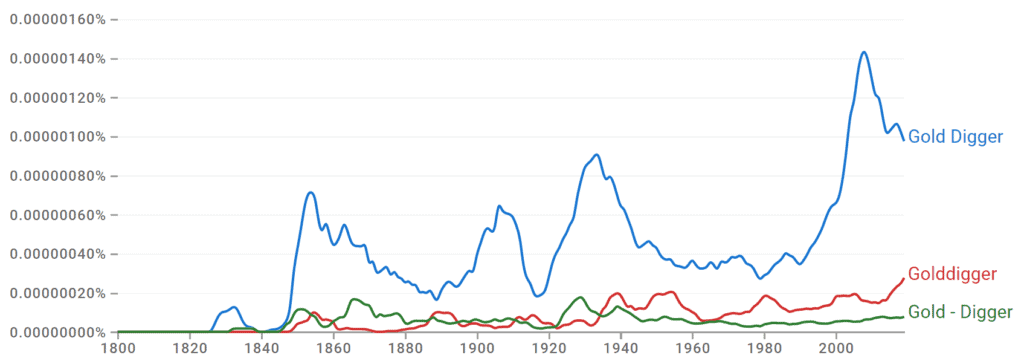In English, we have a word or idiom for just about everything. Kind of like how there’s a meme to convey just about any emotion. One idiom that’s become a part of our cultural lexicon is “gold digger,” which still holds a strong literal and figurative meaning. So, let’s take a second to learn about the definition and origin of the expression and see how you can properly use it.
Meaning of Gold Digger Explained

There are two definitions for “gold digger.” In a literal sense, a “gold digger” is simply someone who digs for gold in the ground, like a prospector during the gold rush or in gold mining. Nowadays, gold diggers, or gold miners, take the gold from the ground using heavy-duty equipment like dozers, haulers and wash plants that literally wash the gold from the dirt.
But in a figurative connotation, the term “gold digger” is meant to describe a person who might be entering a relationship just to take advantage of the other person’s wealth or access to money. The gold digger might use empty promises, give lots of affection and manipulate the innocent person in various ways just to get their money.
The term is usually applied to females marrying older, richer men. But you can use “gold digger” for both men and women alike if they’re someone who digs for gold or the wealth of others.
Origin of the Idiom Gold Digger
So, we already know that the literal meaning comes from gold mining and refers to the individual extracting actual gold from the ground.
But the figurative sense came about in the play “The Gold Diggers” by Avery Hopwood. It premiered on Broadway at the Lyceum Theatre in 1919 and told the tale of a few young women as sly and cunning seductresses of rich men.
Is It Gold Digger, Golddigger, or Gold-Digger?

The right way you should write the term is as two separate words “gold” and “digger.” Yes, it’s occasionally spotted as a single word like “golddigger” or hyphenated as “gold-digger,” but these variations are far less common and usually considered incorrect.
The only exception would be if you’re using it as a phrasal adjective, then you’d hyphenate.
- Your gold-digger wife stole all your money, and now you want my help?
Synonyms to Use Instead of Gold Digger
- Fortune hunter
- Money-grubber
- Opportunist
- Black widow
- Materialist
- Profiteer
- Social climber
- Trophy hunter
Gold Digger Examples in a Sentence

- After discovering her new boyfriend’s large inheritance from his grandparents, Amy quickly revealed herself as a gold digger, despite how sly she thought she was.
- As a wealthy entrepreneur, I’m wary of gold diggers and always keep my financial details a secret from romantic partners.
- My grandpa was a world-renowned gold digger who made his fortune in the Alaskan Klondike.
- The movie was about a gold digger who slept her way to wealth and success.
- Jake’s friends warned him several times that his new wife might be a gold digger, but he insisted their love was genuine.
- The tabloid headlines labeled the new actress a gold digger, so she worked hard to prove them wrong.
Digging for Gold in All the Wrong Places
To sum things up, you can use the term “gold digger” in both a literal and figurative way. Just remember that it’s usually spelled as two separate words. Unless you need it to be an adjective to describe something, you can hyphenate it.
Enjoyed reading about this idiom? Check out some others we covered:
